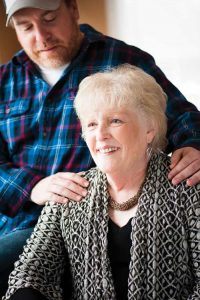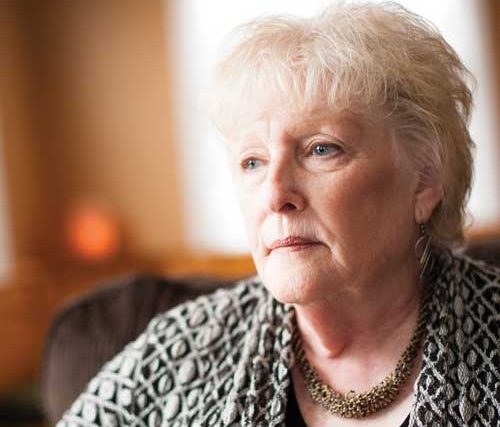Janet Colbert doesn’t want to die. But when she does, she wants it to be on her terms.
The 68-year-old Lakewood resident was diagnosed with terminal liver cancer in early 2013. She has since become a vocal advocate for the passage of legislation that would allow doctors in New Jersey to prescribe medication to painlessly end the lives of terminally ill patients.
The “Aid in Dying for the Terminally Ill Act” passed the state Assembly in November by a 41-31 vote, just weeks after a 29-year-old woman named Brittany Maynard made national headlines for her decision to end her life.
After being diagnosed with an aggressive brain tumor, Maynard and her family moved to Oregon, where the “Death With Dignity Act” was passed in 1997. Before she self-administered life-ending medication on November 1, Maynard released several Internet videos and gave interviews advocating the passage of similar laws throughout the country.
“The New Jersey bill is identical to the law in Oregon,” says Sal Anderton, a lobbyist engaged by national advocacy group Compassion & Choices. “Essentially it would allow a qualified, terminally ill patient to be eligible to get this prescription from a doctor.”
The practice is legal in Vermont, Montana, the state of Washington and parts of New Mexico.
“The United States Supreme Court has upheld the law in this form,” Anderton says. “So it’s a settled question of law.”
If the “Aid in Dying for the Terminally Ill Act” is signed into law, New Jersey residents who have been given a diagnosis of less than six months to live would have to meet eligibility requirements to get a prescription. The bill says a patient must first make a verbal request to the attending physician. At least 15 days later, the patient must make another verbal request and submit a written request signed by two witnesses. A consulting physician must then certify the original diagnosis, and confirm the patient’s mental competency and ability to self-administer the medication. If one of the physicians feels it is necessary, the patient will be evaluated by a mental health professional. Before the prescription is filled, two witnesses, one of whom is neither a relative nor an heir, must attest that the patient is mentally competent.

Colbert and her son Damien have had candid discussions about death for years
“These qualifications really narrow the scope of the legislation tremendously,” Anderton says. “The mental competency requirement rules out anyone with depression or other emotional issues, Alzheimer’s, or dementia. The self-administration also eliminates a lot of folks.”
Colbert, a former oncology nurse, has helped a large number of people through the final days of their lives.
“I’ve been with people in their homes, worked with hospice. There were good deaths and bad ones,” she says. “It can be very hard and painful, or it can be very peaceful. I choose a good, peaceful death.”
John B. Kelly, New England director of Not Dead Yet, a group that opposes the practice, says one of the biggest dangers is for people who outlive their initial diagnosis.
“The truth is, terminal diagnoses are often wrong,” Kelly says. “Once people start talking about a terminal diagnosis, they want us to talk about death. But we have to stop right there, because one out of every six people admitted to hospice care will be discharged. People who think they are dying are often wrong.”
Colbert, who beat breast cancer 14 years ago, has already outlived her doctor’s initial projection.
“When I was diagnosed with this new cancer in 2013, my doctor told me if I did nothing I’d have two to four months to live,” Colbert says. “I went to a liver specialist who told me he couldn’t make any guarantees, but he could do major surgery and take out most of my liver, and I could follow up with radiation treatments. I opted for all of that, and it worked out. It’s been almost a year and a half. I made it to my son’s wedding last June, and I hadn’t planned on doing that.”
Colbert has spent the last year traveling and spending quality time with family and friends. She is grateful for the period of relative health she’s enjoying, but she knows it won’t last forever.
“This isn’t a miracle,” she says. “I do believe in miracles; I’ve seen them happen. But I have this disease, and it’s going to kill me. There’s no way out of it, and I don’t really know how the ending is going to be. I want to live – it’s not like I want to die – but the cancer is killing me, and I just want to be the one to choose when I can’t take it anymore. I don’t want to be incoherent on pain medication and lying there for a week unable to communicate with my family. That’s not how I want to check out.”
Hospital executive Anthony Mazzarelli, MD, says the legislation and practice are controversial in the medical community because of the “double-edged sword” of medical ethics.
“On one side, there’s a person’s right to determine their own fate and determine the circumstances of their death. People are autonomous and should make these decisions for themselves,” says Mazzarelli, senior vice president and chief medical officer of Cooper University Health Care. “On the other side, it’s a large violation of many people’s faiths, and there’s the question of whether it’s a violation of the tenets of morality in healthcare.
“‘Do no harm’ is the modern-day interpretation of the theory behind the Hippocratic Oath, but harm is a relative term,” he explains. “Some would argue the ultimate harm is death, and others would say someone being forced to live with a terminal illness and not choose the manner of their death is causing more harm.”
Mazzarelli thinks much of the controversy enveloping the issue is the result of society’s reluctance to discuss death and dying.
“We’ve been having this same discussion for a long time, and nothing has changed,” Mazzarelli says. “I don’t think we’ve become much better educated on death. The medical community has been reluctant to embrace studying and understanding death, and that’s why this conversation is the same.”
Mazzarelli says he hopes the political course of the legislation will spark an evolving discussion in the medical community, particularly in light of recent headlines.
“Brittany Maynard’s death has revived this discussion, because this time you have someone who’s talking about it on Facebook and other social media,” he says. “Someone who was very young and didn’t look terminally ill became an advocate for the law.”
Colbert believes it is crucial to have conversations about death, both with family members and doctors.
“My son and I have talked about things like this for most of his life because I’ve been a cancer nurse forever,” Colbert says. “He knows how strongly I feel about it. You have to accept it, because it is what it is. I feel like I need to take charge, deal with it and spend every day trying to help people understand that death shouldn’t be a taboo subject. We shouldn’t be afraid to talk about it, because we’re all going to do it. There are also doctors who aren’t comfortable telling you there’s nothing they can do for you, but cancer waits for no one. There has to be a time when a doctor is honest, and can feel comfortable having an honest conversation about the end of your life.”
Colbert says Maynard’s courage in speaking out about her decision to die sparked her own desire to become an advocate.
“Now I realize I have a mission, and I want to spend as much time as I can getting the word out and clearing up misconceptions,” Colbert says. “She was the perfect person to put a face on this issue, because if it were me who had her diagnosis and got some local press, it wouldn’t have made national news. I’m almost 70 years old, and it wouldn’t have had the same impact. But she was having seizures, and there were periods where she didn’t know her husband’s name. She decided that was not the downhill road she wanted to take. She wanted to go when she could still look at her family and love them and know them. It’s a shame she had to move to another state to do that.”
Colbert will stay in New Jersey, though she has considered moving to a state where the practice has already been legalized.
“I have entertained the idea of Vermont and establishing residency there,” she says. “But then I wouldn’t have my family around me. I wouldn’t have my friends. Now I go out to lunch, out to dinner. I go places, and I have fun with my loved ones. If I moved, I would be dying alone in a strange state. For me, that’s not the answer. The answer is that it should be legalized in every state.”
Kelly, from the advocacy group Not Dead Yet, says the bill singles out people with disabilities. He suffered a spinal cord injury in 1984 at the age of 25.
“In our community, there are people who have been given terminal diagnoses, some many times and some since birth,” Kelly says. “You cannot make a distinction between people who are dying and people who are disabled, because in many cases we have the same characteristics. There are many disabled people living with difficult conditions, and we are constantly getting the message that we would be better off dead.”
Kelly is not alone in maintaining the legislation could negatively affect people with disabilities. In fact, when the bill was released to the full Assembly by the Health and Senior Services Committee last June, two committee members who voted “yes” said they hoped changes would be made before the bill’s passage to protect people with disabilities.
“I was able-bodied until 25, so I really understand the difference in what people feel and how people with disabilities are treated,” Kelly says. “In our culture, if you’re not fully autonomous and able to do everything yourself, you’re looked down on. People are terrified of that; they’re terrified of becoming a burden, of being remembered as a disabled, debilitated, even demented person. So what starts out as a choice becomes a duty to your family and loved ones – a duty to die.”
Kelly also finds the legislation lacking in the area of government oversight. “The program is set up to learn nothing about what happens when someone dies this way,” he says. “The law establishes no oversight or data verification. We never know if there were witnesses, if there were abuses. Once the prescription is filled and the drugs leave the pharmacy, the state and the doctors take no more interest.”
To become law in New Jersey, the bill must pass a State Senate vote and be signed by Governor Chris Christie, who has publicly said he will veto the legislation. Anderton, who will continue lobbying for the bill’s passage, says he hopes public opinion will sway the governor.
“I hope that when the legislature puts this bill on his desk, we have the opportunity to give him our information and tell him our stories,” Anderton says. “I hope he sees it like we do: that this is a right New Jersey residents should have.”
While discussion of the “Aid in Dying for the Terminally Ill Act” has not yet begun on the Senate floor, the battle rages on in the press. The fundamental disagreement between supporters and opponents even extends to the terminology used to describe the practice. Supporters call it “death with dignity,” while opponents refer to it as “assisted suicide.”
“We have this belief that dignity is something that can be lost,” Kelly says. “But there are different definitions of dignity, and it’s inherent in everyone. We reject the idea that the State of New Jersey can decide who does and does not have dignity.”
Colbert has put a great deal of thought into how she’d like to die. She’d like to end her life quietly, at home, with her son and daughter-in-law by her side.
“The day before, though, I’d have all my friends over and we’d have a party,” she says. “I haven’t been able to drink, and I do love my margaritas. Of all the cancers, I had to get the one that means I can’t have alcohol! But as soon as they tell me there’s nothing more they can do, the first stop is the liquor store for good tequila, and then I’ll have the last margarita of my lifetime. I’m going to die, but I’m trying to live while I’m dying.
“I’ll have my party and really celebrate life, and then when I go, it’ll be with happy memories fresh in my mind and my son holding my hand. I know it’s sad for the people we leave behind, but I’d be at peace. I hope that would help my family find peace.”
That notion of a death of her choosing may not become a reality for Colbert, who does not anticipate the bill will become law before she dies. “I know this won’t happen in my lifetime in New Jersey, and that makes me very sad,” she says. “But if I can fight for this for someone else who won’t have to go through it like I am, I’m happy to do it. I’d like to make a video in case I’m gone, so they can show it to the courts and the legislators. I’d like them to see me as I’m dying, and to see that it didn’t have to be this way.”










